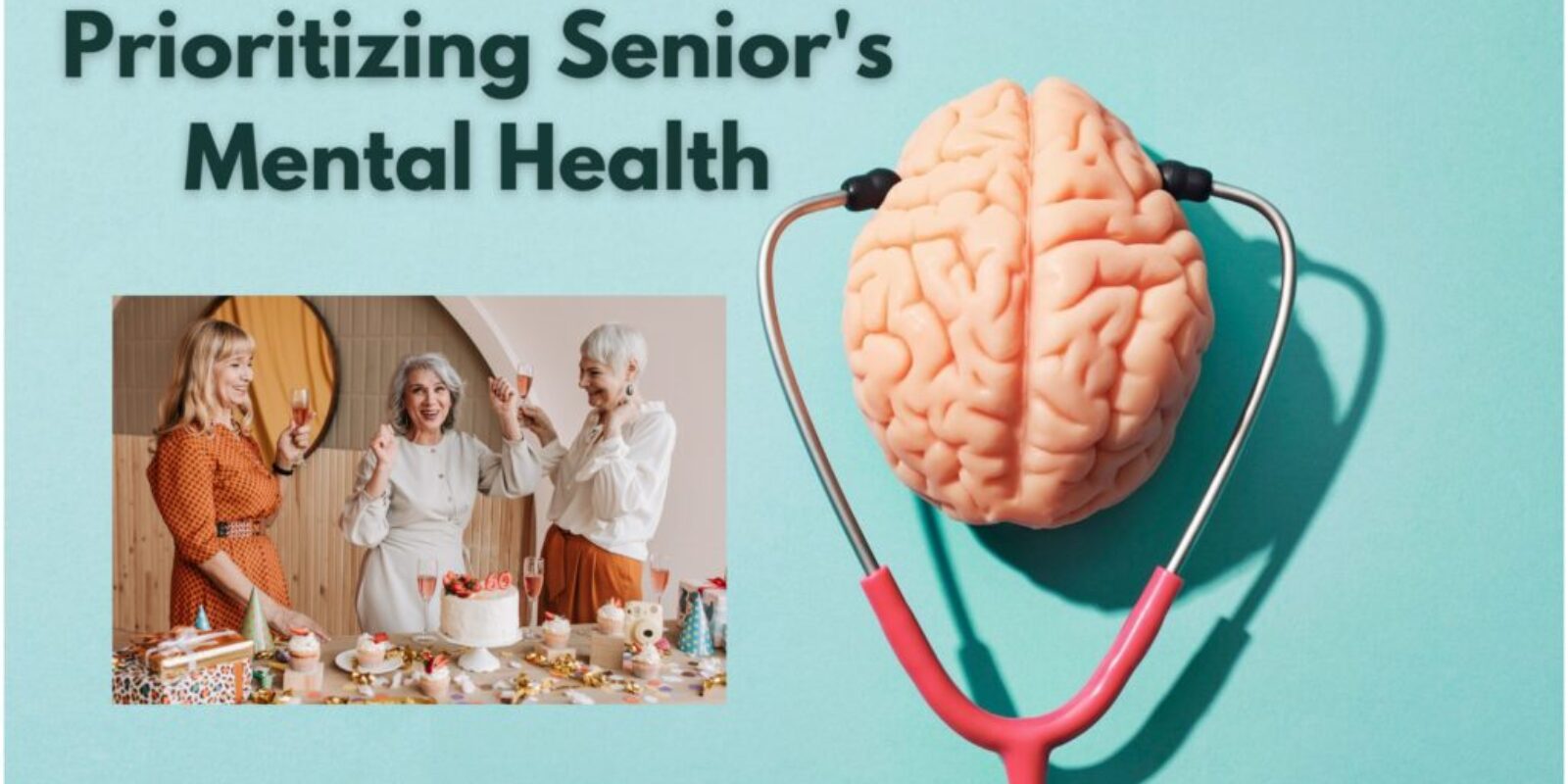As we age, it becomes imperative to prioritize and uphold good mental well-being alongside physical health. Never overlook your mental health as you age. Your ability to think and focus can determine your happiness and stress levels after you retire.
Contents
Everything You Need to Know About Mental Health and Aging
Mental health in aging is an important discussion as you retire. We’ll look at the different factors that affect their overall welfare. You’ll also receive tips on keeping your mind in top shape.
Prefer to listen rather than read?
Physical and Emotional Challenges
Getting older naturally brings a range of physical and emotional changes. It’s crucial to recognize and tackle these challenges to maintain mental health in aging.
Physical Health Decline
As we age, it’s common to see a decline in physical health. You might find it disheartening when your body isn’t as robust or nimble as before. Even simple activities like climbing stairs, reaching for something on a high shelf, or walking can become tough and painful. This struggle can make you feel powerless and impact your mental health in aging.
Bereavement
Bereavement is another significant challenge for aging adults. The pain of losing spouses, siblings, or close friends is profound and often brings a harsh reminder of our own mortality. These losses can deeply affect our emotions, leading to sadness, loneliness, and depression.

Changes in Social Roles
Retirement can also alter social roles significantly. Leaving a career can lead to a loss of purpose and identity. With fewer work-based social interactions, you might find your social life and support network shrinking. This change can leave you feeling isolated and affect your overall well-being.
Advantages of Prioritizing Mental Health in Aging
All of this talk about mental health in aging seems like a bother? Shouldn’t your retirement years be about resting your body after decades of hard work? There are actual good things you can expect when you build up your mind as you gradually grow old.
Let’s go over the different reasons why you should put as much importance to mental health in aging as your retirement fund.
Improved Cognitive Abilities
Engaging in various mental exercises and activities can help maintain cognitive function and prevent cognitive decline.

Puzzles
One effective way to support cognitive health is through engaging in puzzles. It could be filling out the Sunday crosswords or spinning a rubic cube. These simple games challenge your mind so you can memorize complicated stuff and solve most problems.
These activities require concentration, attention to detail, and the ability to form connections and patterns, which exercise and strengthen the brain.
Reading
Reading is another valuable mental exercise that promotes cognitive abilities in older adults. Reading stimulates the brain by enhancing vocabulary, comprehension skills, and logical reasoning. It exposes individuals to new ideas, information, and perspectives, keeping the mind active and receptive.

Whether it’s novels, non-fiction books, newspapers, or magazines, reading provides a cognitive workout that can contribute to improved cognitive function and mental agility.
Learning Something New
Picking up new skills is a fantastic way to enhance your brainpower. We’re talking about learning to play the flute, taking up oil painting, and growing vegetables. Any activities you are new to will stimulate your brain and give it a good workout. Hobbies help you learn, adapt, and create new neural pathways.
Learning new activities boosts neuroplasticity. In other words, new hobbies can help your brain reorganize itself and form new connections, leading to better cognitive function and a tougher brain.
Engaging in these mental exercises not only keeps your cognitive abilities sharp but also builds what’s known as cognitive reserve. Cognitive reserve helps your brain cope with age-related changes and tackle new cognitive challenges effectively.
It’s important to make sure these mental exercises are diverse and challenging. They should engage different areas of cognition like memory, attention, language, and problem-solving skills to give your brain a comprehensive workout.
Reduced Risk of Mental Disorders
When seniors prioritize their mental health in aging, they significantly reduce their susceptibility to mental disorders like depression, anxiety, and dementia.
Engaging in regular social interactions, keeping mentally stimulated, and seeking professional support. When necessary all play vital roles in minimizing the risk of developing these conditions. By prioritizing mental well-being, aging adults can lead healthier and more fulfilling lives.
Improved Emotional Well-being
Emotional well-being is pivotal for overall happiness and contentment. Taking care of mental health empowers aging adults to cope with life’s challenges, manage stress, and maintain a positive outlook. Consequently, this enhances their emotional well-being and resilience.
Strategies for Promoting Mental Health in Aging
Mental health in aging is important. Below are ways you can strengthen your mind. These strategies will help you memorize small details and focus on hard tasks. Also to lessen your chances of depression and other mental illnesses.
Encourage Regular Physical Activity
Daily exercises is key to a better mind. Simple exercises like walking, swimming, or yoga are great for their bodies and minds. These activities help lift moods, reduce stress, and increase overall energy.
Staying active also improves sleep, which is important for thinking clearly and staying emotionally balanced. Plus, when older adults join exercise groups or classes, they meet people. You are sharpening your body and building newer bonds at the same time.

A regular routine of light exercise can make aging adults feel more energetic and mentally sharp. It boosts mental health in aging and helps them manage their health better. There is also time management when you have a routine. You are doing problem solving when finding ways to fit a workout in your schedule.
The Release of Endorphins
One of the key benefits of exercise for mental health in aging is the release of endorphins, often referred to as the “feel-good” hormones. When we engage in physical activity, our bodies naturally produce these chemicals, which are known to boost mood, reduce stress, and induce a sense of well-being.
Endorphins act as natural painkillers and mood elevators, helping to alleviate symptoms of anxiety, depression, and other mental health conditions commonly experienced by aging adults.

Reduction of Stress Levels
Regular physical activity also contributes to the reduction of stress levels. Stress is a significant factor that can negatively impact mental health in aging and overall well-being. By engaging in exercises such as walking, swimming, or yoga, aging adults can effectively manage stress and its associated symptoms.
Physical activity provides an outlet for pent-up energy and tension, helping to relax both the body and mind. It promotes a sense of calmness, clarity, and inner peace, enabling older individuals to cope better with the challenges and pressures of daily life.
Improve Overall Brain Health
Exercise increases blood flow to the brain, which stimulates the growth of new neurons and strengthens neural connections. This process, known as neuroplasticity, plays a vital role in maintaining cognitive abilities, preventing cognitive decline, and reducing the risk of neurodegenerative disorders such as dementia.
Improve Sleep Quality
Furthermore, regular physical activity has been shown to improve sleep quality, which is essential for overall mental health in aging. Seniors often experience changes in sleep patterns, including difficulties falling asleep or staying asleep throughout the night.

Exercise helps regulate the sleep-wake cycle, promoting deeper and more restorative sleep. By achieving better sleep, older individuals can experience improved mood, increased cognitive function, and enhanced overall well-being.
To encourage seniors to engage in regular physical activity, it is important to provide a variety of options that suit their abilities, preferences, and interests.
Foster Social Engagement
Encouraging older adults to maintain social connections and engage in various activities is essential for their mental health in aging and overall well-being. As individuals age, social interactions and relationships play a vital role in combating loneliness and enhancing a sense of belonging and overall happiness.
Joining Clubs
Encourage older adults to join clubs aligned with their interests and hobbies, such as book clubs or gardening groups. This promotes social engagement and opportunities to connect with like-minded individuals, leading to a positive mental state and overall well-being.
Attending Community Events
Older adults can stay socially connected by attending community events like fairs, festivals, and cultural gatherings. These events offer a chance to interact with diverse people and foster a sense of belonging. They can also provide opportunities to learn and broaden one’s perspective.
Staying in Touch With Friends and Family
Maintaining social connections is important for mental health in aging. Encouraging older adults to communicate regularly with loved ones through calls, video chats, or in-person visits can help strengthen relationships. Family gatherings provide valuable social engagement and emotional support. These connections contribute to a positive mental state.
Volunteering
Older adults can improve their mental well-being by participating in group activities, volunteering, or team sports. These activities foster camaraderie, collaboration, and support, while also promoting physical health and a sense of belonging. Volunteering allows them to contribute to their community and connect with like-minded individuals.

Social connections are crucial for the emotional well-being of older adults. Loneliness and social isolation can lead to mental health problems like depression and anxiety. To prevent these negative outcomes, it is important to encourage them to maintain social connections, engage in activities, and nurture relationships.
Support Healthy Lifestyle Choices
Promoting a healthy lifestyle is paramount in supporting mental well-being, especially for aging adults. By encouraging and adopting healthy habits, we can positively impact their overall mental health in aging and contribute to a higher quality of life.
Maintaining a Balanced Diet
Maintaining a balanced diet is a vital part of a healthy lifestyle. Older adults should eat a variety of nutritious foods containing vitamins, minerals, and antioxidants to enhance brain function.
A diet with fruits, vegetables, whole grains, lean proteins, and healthy fats can help in promoting mental well-being. Drinking enough water is also crucial to maintain cognitive function and overall health.
Sufficient Sleep
A good night’s sleep is crucial to good mental health in aging. Elderly individuals should get 7-9 hours of sleep each night and establish a regular sleep routine. Creating a calming sleep environment, practising relaxation techniques, and avoiding stimulating activities before bedtime can all help improve sleep quality.
Moderate Alcohol Consumption
Moderate alcohol consumption is another aspect of a healthy lifestyle that can impact mental health in aging. Educating aging adults about the potential risks associated with excessive alcohol intake and promoting responsible drinking habits is crucial.

Encouraging them to moderate their alcohol consumption and providing information about the recommended limits set by health authorities can help prevent alcohol-related mental health issues and promote overall well-being.
Abstaining From Smoking and Substance Abuse
In addition to promoting healthy habits, it is vital to emphasize the importance of abstaining from smoking and substance abuse. Smoking and the use of illicit drugs or excessive alcohol can have severe negative effects on cognitive function and mental health in aging.
Educating aging adults about the risks associated with these substances and providing resources and support for smoking cessation or substance abuse treatment can significantly contribute to maintaining their mental well-being.

Provide Access to Mental Health Support
Ensuring that elderly individuals have access to comprehensive mental health in aging support services is of utmost importance. It is crucial to prioritize their well-being by providing them with information and resources that can address their mental health needs effectively.
Providing Details on Nearby Support Groups, Counselling, and Therapy Choices
One way to support aging adults is by offering information about local support groups, counselling services, and therapy options. These resources can provide a safe and supportive environment where they can discuss their feelings, concerns, and experiences with individuals facing similar challenges.
Support groups offer a sense of belonging and understanding, fostering connections and reducing feelings of isolation. Counselling services and therapy options, whether individual or group sessions, can provide professional guidance and help develop coping strategies to manage mental health concerns.
Regular Check-Ins With Healthcare Professionals
Regular check-ins with healthcare professionals are crucial for identifying and addressing issues in mental health in aging adults. Primary care physicians or geriatric specialists can conduct routine screenings and assessments to detect signs of distress or cognitive decline and provide appropriate interventions, referrals, and treatment monitoring. Consistent follow-up allows for early intervention, ensuring effective and prompt mental health care.

Older adults need to be informed about local resources for mental health in aging, like mental health clinics, helplines, or crisis hotlines, to help them and their caregivers seek help when needed. Such information can be shared through healthcare facilities, community centres, senior centres, or online platforms.
Collaboration between healthcare professionals, community organizations, and caregivers is essential in creating a supportive environment for aging adults. By sharing information and coordinating efforts, a network of mental health support services can be developed to meet their unique needs, bridging gaps in resource availability and ensuring access to necessary support.
Furthermore, it is essential to consider the specific needs and preferences of aging adults when designing mental health support services. This may involve offering telehealth options for those who have limited mobility or difficulty accessing in-person services. Providing culturally sensitive and language-appropriate services is also crucial in ensuring inclusivity and accessibility for all aging adults.
Educate on Self-Care Practices
Educating aging adults about the significance of self-care and empowering them to prioritize their well-being is crucial for maintaining good mental health in aging and overall quality of life. Encouraging the incorporation of self-care practices into their daily routines can have a profound impact on their emotional, cognitive, and physical well-being.
Educating elderly individuals regarding the scope and constraints of self-care is crucial. It is crucial to motivate them to solicit expert assistance when required, including consulting with healthcare providers or mental health specialists. This guarantees that they obtain suitable direction, treatment, and interventions for any intricate concerns or mental health problems that may surface.
Address the Impact of Life Transitions
Aging often comes with significant life transitions such as retirement, loss of loved ones, or changes in health. Actively listening to their concerns, validating their feelings, and offering empathy can make a significant difference in their emotional well-being.
Creating a safe and non-judgmental space where they can freely express their emotions and thoughts allows them to process their experiences and adapt to the changes they are facing.
Counselling sessions can offer a supportive environment for older adults to explore their feelings, gain new perspectives, and develop effective strategies to manage stress, grief, or other emotional difficulties. Peer support and shared experiences can offer comfort, validation, and a sense of belonging, reducing feelings of isolation and loneliness.

By implementing these strategies, we can promote mental health in aging adults and enhance their overall well-being. It is essential to create an environment that values and supports mental health in aging, enabling aging adults to lead fulfilling and meaningful lives.
Conclusion
Giving priority to mental health among aging adults is paramount. By acknowledging the connection between mental well-being and overall quality of life, we can assist aging individuals in leading fulfilling lives while preserving their independence.
Through strategies such as regular physical activity, social engagement, healthy lifestyle choices, and access to mental health support, we can promote positive mental health outcomes and enhance the well-being of aging adults.



